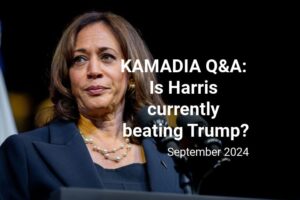Q&A with Thomas Gift, Associate Professor of Political Science at University College London
Update: Kindly note that the iDose Newsletter accompanying this interview was initially emailed directly to subscribers. It was only made available online days after. Don’t miss your opportunity to subscribe and get the latest newsletters delivered to your inbox. It’s free and you can unsubscribe and at any moment.
Editor’s Note: With election day less than two weeks away, what should we be paying attention to while being overwhelmed by information, advertising and propaganda? Thomas Gift discusses some important areas. Please note that the following interview was not conducted by iDose Magazine.
Are there any data points or indicators you’re looking at to gauge whether Trump or Harris is more likely to win Michigan?
FiveThirtyEight has the odds of Harris or Trump winning Michigan – and its crucial 15 Electoral Votes – as virtually dead even. Zooming in, Oakland County (which includes suburban Detroit) and Kent County (which includes Grand Rapids) are two places to watch. Both have been trending blue in recent elections, but some polling shows Trump making inroads there.
In 2020, Joe Biden won Oakland and Kent counties combined by over 130,000 votes, and his statewide margin in Michigan was about 154,000. So, Trump doesn’t have to win those counties. He just needs to improve his performance there by, say, ten or twenty thousand votes and then do a bit better than he did four years ago in Michigan’s rural counties. If he does, he could crack the “blue wall.” On the flip side, if Harris can exceed Biden’s margin in Oakland and Kent Counties, Trump will need to significantly outperform outside the major cities to win.
How much of a threat does some voters’ dissatisfaction with Harris’s stance on Gaza pose to Democratic voter turnout in Michigan?
There are certainly Democrats who won’t vote for Harris because of what they allege has been her insufficient support for Gaza. They are, by and large, single-issue Democrats who likely won’t vote Trump. They just might not vote at all. They’re taking an uncompromising line: that if a candidate doesn’t meet the threshold of what they consider acceptable on Israel-Palestine, they’re just going to abstain from voting. Michigan is home to the largest Arab-American population in the nation. Remember that during the primary back in February, more than 101,000 Michigan Democrats voted “uncommitted” when Biden was the nominee. That makes up about two-thirds of the vote disparity by which Biden beat Trump in 2020. And it’s not just Michigan. In North Carolina, as well, more than 88,000 Democrats voted “no preference” in the primaries over Gaza. Clearly, this is a serious concern for Harris.
Will Trump’s remark that losing in November would make the entire country “be like Detroit” hurt him Michigan?
Trump has a record of insulting voters whose support he needs. It’s the kind of statement that must make his political advisers go mad because it’s the opposite of pandering. It’s just gratuitously making enemies in a state that Trump absolutely needs. Then again, Trump has a history of getting away with these kinds of remarks. For example, he called his own supporters “disgusting” in 2020 and has repeatedly used racially-charged language. Still, he could be on pace to win a larger share of the Black vote of any Republican presidential candidate in history. Trump has talked about immigrants from [insert expletive] countries and called many Mexican immigrants rapists. Still, he’s been gaining ground with Latinos. This also isn’t even the first time Trump has pilloried a whole city. He once labeled Baltimore a “disgusting, rat and rodent infested mess.” Of course, part of Trump’s appeal to the MAGA base is his willingness to use off-color language and not apologize for it.
Will labor union votes make a big difference in Michigan?
Labor unions certainly aren’t as strong as they used to be in Michigan, but they’re still a serious force in politics. What’s clear is that Harris hasn’t been especially effective at courting this constituency. As the Republican Party has shifted more toward populism, it’s picked up considerably more support from blue-collar, working-class voters. Recall that the International Brotherhood of Teamsters, one of the largest labor unions in America, declared back in September that it wouldn’t endorse a candidate. Reportedly, internal polling showed that its rank-and-file favored Trump over Harris by about 25 percentage points. That’s a huge margin, especially given that labor has tended to be a reliable Democratic voting bloc. Part of Harris choosing Minnesota Governor Tim Walz as her running mate is that he was supposed to appeal to union voters in the upper mid-West, including Michigan. It’s not clear that’s worked.
Thomas Gift is Associate Professor of Political Science at UCL, where he is director of the Centre on US Politics (CUSP)
Note: The views expressed in this article are the author’s, and not the position of Intellectual Dose, or iDose (its online publication). This article is republished from the LSE USAPP blog under a Creative Commons license



